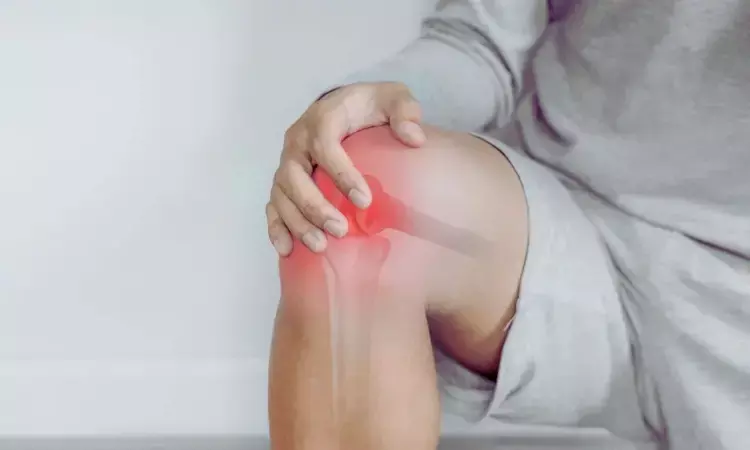- Home
- Medical news & Guidelines
- Anesthesiology
- Cardiology and CTVS
- Critical Care
- Dentistry
- Dermatology
- Diabetes and Endocrinology
- ENT
- Gastroenterology
- Medicine
- Nephrology
- Neurology
- Obstretics-Gynaecology
- Oncology
- Ophthalmology
- Orthopaedics
- Pediatrics-Neonatology
- Psychiatry
- Pulmonology
- Radiology
- Surgery
- Urology
- Laboratory Medicine
- Diet
- Nursing
- Paramedical
- Physiotherapy
- Health news
- Fact Check
- Bone Health Fact Check
- Brain Health Fact Check
- Cancer Related Fact Check
- Child Care Fact Check
- Dental and oral health fact check
- Diabetes and metabolic health fact check
- Diet and Nutrition Fact Check
- Eye and ENT Care Fact Check
- Fitness fact check
- Gut health fact check
- Heart health fact check
- Kidney health fact check
- Medical education fact check
- Men's health fact check
- Respiratory fact check
- Skin and hair care fact check
- Vaccine and Immunization fact check
- Women's health fact check
- AYUSH
- State News
- Andaman and Nicobar Islands
- Andhra Pradesh
- Arunachal Pradesh
- Assam
- Bihar
- Chandigarh
- Chattisgarh
- Dadra and Nagar Haveli
- Daman and Diu
- Delhi
- Goa
- Gujarat
- Haryana
- Himachal Pradesh
- Jammu & Kashmir
- Jharkhand
- Karnataka
- Kerala
- Ladakh
- Lakshadweep
- Madhya Pradesh
- Maharashtra
- Manipur
- Meghalaya
- Mizoram
- Nagaland
- Odisha
- Puducherry
- Punjab
- Rajasthan
- Sikkim
- Tamil Nadu
- Telangana
- Tripura
- Uttar Pradesh
- Uttrakhand
- West Bengal
- Medical Education
- Industry
Weight Loss After Antiobesity Medication May Lower Joint Replacement Revision Risk: JAMA

China: A recent cohort study utilizing a target trial emulation approach has highlighted the potential benefits of postoperative weight loss induced by anti-obesity medications in reducing the long-term revision risk following joint replacement procedures. The findings, published in JAMA Network Open, suggest that patients with obesity who achieve a greater degree of weight loss within a year of starting anti-obesity medications experience a lower likelihood of requiring revision surgery at both five-year and ten-year intervals.
"Greater weight loss within a year of starting anti-obesity medications was linked to a lower risk of joint replacement revision at five and ten years. This suggests that safe and sustainable weight loss through medication may help improve the longevity of hip and knee implants in patients with obesity," the researchers wrote.
The 2023 American College of Rheumatology and American Association of Hip and Knee Surgeons Clinical Practice Guideline states that obesity alone should not delay joint replacement. This is expected to lead to a significant rise in joint replacement procedures among obese patients. However, these patients face a higher risk of revision, adding complexity and cost to the surgery. It remains uncertain whether postoperative weight loss can reduce this risk.
To address this gap, Dongxing Xie, Department of Orthopaedics, Xiangya Hospital, Central South University, Changsha, China, and colleagues examined the impact of weight loss following anti-obesity medication use on the likelihood of revision in patients undergoing hip or knee replacement.
For this purpose, the researchers conducted a retrospective cohort study using target trial emulation, a causal inference framework, to analyze patients with obesity who underwent hip or knee replacement. The study utilized data from the IQVIA Medical Research Database (2000-2023), with statistical analysis performed between October 2023 and June 2024.
The researchers examined the association between weight loss achieved within a year of starting anti-obesity medications—categorized as small-to-moderate (2%-10%) or large (≥10%)—and the risk of revision surgery at five and ten years. The analysis focused on medications such as orlistat, sibutramine, glucagon-like peptide-1 receptor agonists, and rimonabant to determine their impact on long-term implant outcomes.
Key Findings:
- Among 3,691 participants (mean age 64.7 years, 62.9% women), the 5-year revision risks were 5.6% for the weight gain or stable group, 4.4% for the small-to-moderate weight loss group, and 3.7% for the large weight loss group.
- Compared to the weight gain or stable group, the hazard ratio (HR) for revision was 0.75 in the small-to-moderate weight loss group and 0.57 in the large group.
- Separate analyses for hip and knee replacements showed similar trends.
- In knee replacement patients, HRs for revision were 0.55 for small-to-moderate weight loss and 0.49 for large weight loss compared to the weight gain or stable group.
- In hip replacement patients, the corresponding HRs were 0.82 and 0.53 for small-to-moderate and large weight loss groups, respectively.
- There were consistent findings regarding the association between weight loss and 10-year revision risks after initiating anti-obesity medications.
The findings indicate that pharmacotherapy-induced weight loss, which is relatively safe, effective, and sustainable, may help improve implant survivorship in obese patients undergoing hip or knee replacement. The cohort study, emulating a randomized controlled trial, showed that greater weight loss within a year of starting anti-obesity medications was linked to a lower risk of revision at five and ten years.
"These results highlight the potential role of anti-obesity medications as a valuable strategy for enhancing long-term joint replacement outcomes in this patient population," the researchers concluded.
Reference:
Xie D, Englund M, Lane NE, et al. Postoperative Weight Loss After Antiobesity Medications and Revision Risk After Joint Replacement. JAMA Netw Open. 2025;8(2):e2461200. doi:10.1001/jamanetworkopen.2024.61200
Dr Kamal Kant Kohli-MBBS, DTCD- a chest specialist with more than 30 years of practice and a flair for writing clinical articles, Dr Kamal Kant Kohli joined Medical Dialogues as a Chief Editor of Medical News. Besides writing articles, as an editor, he proofreads and verifies all the medical content published on Medical Dialogues including those coming from journals, studies,medical conferences,guidelines etc. Email: drkohli@medicaldialogues.in. Contact no. 011-43720751


